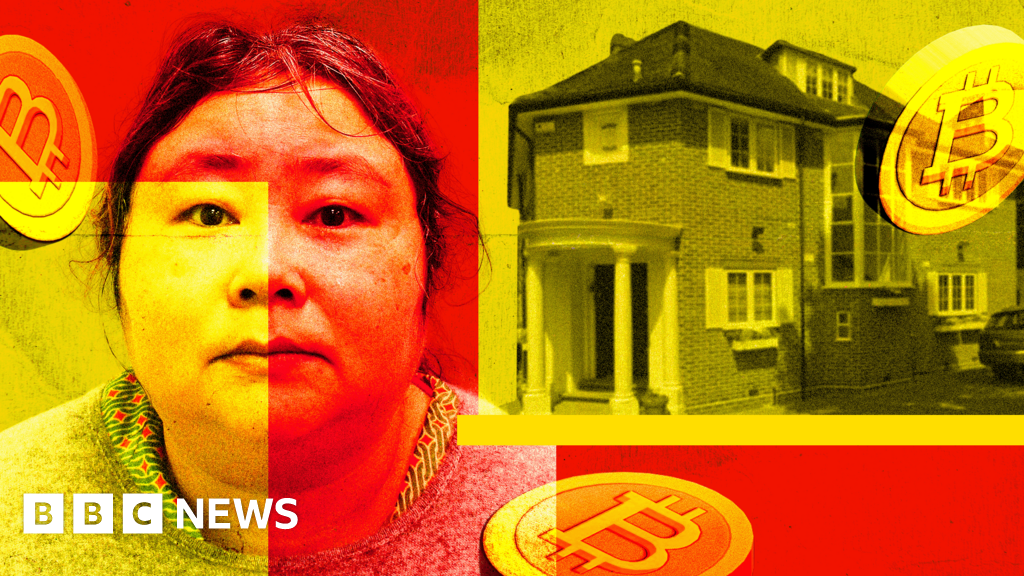A woman accused of buying cryptocurrency now worth billions of pounds with money stolen from thousands of Chinese pensioners is due to be sentenced this week for money laundering.
After fleeing China, she moved to a mansion in Hampstead, north London. Metropolitan Police raided the property a year later and made one of the world’s largest single crypto seizures.
More than 100,000 Chinese people invested in her company, which claimed to be developing high-tech health products and mining cryptocurrency. Police say the business, Lantian Gerui (Bluesky Greet), was an elaborate scam and that its founder, Qian Zhimin, embezzled investors’ funds. Victims told the BBC World Service they hope to recover some money from UK authorities. Anything unclaimed would normally default to the UK government, prompting speculation the Treasury could benefit.
“If we can gather all the evidence together, we hope the UK government, the Crown Prosecution Service and the High Court can show compassion,” said one victim, who asked to be called Mr Yu. He says his marriage failed as a result of the fraud. “Because now, it’s only that haul of Bitcoin that can return us a little bit of what we lost.”
Qian, 47, arrived in the UK under a fake passport in September 2017 after Chinese police began investigating her. She rented a mansion on the edge of Hampstead Heath for more than £17,000 a month. To fund the lifestyle, she needed to convert cryptocurrency into spendable cash. She posed as an antiques and diamond heiress and employed a former takeaway worker, Wen Jian, as a personal assistant to trade the cryptocurrency into assets like cash and property.
As Bitcoin rose in value, Qian’s holdings allowed her to deliver the returns her company promised, that investors could “get rich while lying down.” Wen later told a trial—where she was jailed for six years for money laundering—that Qian spent much of her time gaming and shopping. Qian also wrote a six-year diary plan outlining schemes including founding an international bank, buying a Swedish castle and currying favour with a British duke. She even aspired to become queen of Liberland, an unrecognised microstate on the Croatian-Serbian border.
Attempts by Qian to buy an especially large Totteridge Common property triggered a police inquiry when Wen could not account for her boss’s wealth. A subsequent raid on Qian’s Hampstead rental uncovered hard drives and laptops loaded with tens of thousands of Bitcoin—believed to be the largest crypto seizure in UK history.
Lantian Gerui, set up in China four years earlier, claimed to mine Bitcoin and invest in pioneering tech. UK police and prosecutors say the firm instead used promises of high profits to draw in more investors. Detective Constable Joe Ryan of the Met described Qian as manipulative and the leader of the fraud.
Investors were encouraged by daily small payouts—about 100 yuan—which created confidence and prompted many to borrow to invest more. Mr Yu and his wife initially invested 60,000 yuan each after being told they would make 200% profit over 2½ years. Many reinvested their daily payouts. Marketing rewarded investors who recruited new members, helping the scheme reach roughly 120,000 people across China. Documents from Chinese trials of the company’s promoters show deposits totalling more than 40bn yuan (about $5.6bn, £4.2bn), according to the UK’s Crown Prosecution Service. A former employee testified that daily payouts were funded by new investors’ money, not mining dividends.
The company marketed heavily to middle-aged and elderly Chinese, exploiting loneliness and patriotism. Qian wrote poems about social responsibility and the business staged mass meetings, holidays and banquets to attract more investors. Endorsements from high-profile figures—including, according to Mr Yu, the son-in-law of Mao Zedong—helped persuade many to trust the scheme. Some investors attended events at the Great Hall of the People, Mr Yu and others said.
Despite the public profile, Qian was secretive and known to clients only as Huahua (Little Flower). She met only the largest investors—those who put in at least 6m yuan—at intimate events. One investor, Mr Li, said he and relatives invested about 10m yuan between them after being told Qian would provide wealth for three generations.
A Chinese police probe launched in mid-2017 led to payouts stopping. Company managers reassured investors and urged them not to contact police. Mr Yu later learned from Chinese court cases that Qian had paid managers to calm investors while she fled to the UK. In her diary she sketched a plan to repay Chinese debts when Bitcoin reached £50,000 per coin, but also earmarked millions for developing Liberland.
Qian was arrested in York in April last year. Police found four other people in the house who had been brought to the UK to work for her in roles including shopping, cleaning and security; they were employed illegally. Initially she denied charges, saying she was escaping a Chinese crackdown on crypto entrepreneurs and disputing Chinese police evidence. At her trial in September she unexpectedly pleaded guilty to illegally acquiring and possessing the cryptocurrency.
Wen’s trial and conviction, and Qian’s guilty plea, gave victims a “glimpse of sunlight,” said Mr Li. The Bitcoin Qian brought to the UK has multiplied more than 20-fold since her arrival. Its fate will be decided in a civil “proceeds of crime” case starting in earnest early next year.
Thousands of Chinese investors plan to make claims in that case, lawyers representing victims say, but proving claims will be difficult for many. Some payments were made to local promoters who then passed cash up the chain, rather than directly to Qian’s company. It is unclear whether successful claimants will receive their original investment or an amount reflecting Bitcoin’s rise. Any leftover money would normally revert to the UK government; the BBC asked the Treasury what it plans to do with remaining funds but received no response.
Separately, the CPS said it was considering a compensation scheme for those without representation in the civil case, but would not disclose details. The personal toll on victims has been heavy: Mr Yu’s marriage ended, and he has limited contact with his son. One lawyer said many investors were left without money for food or medicine. Mr Yu recalled a woman from Tianjin who died of breast cancer after leaving hospital because she could not afford treatment. He wrote a poem in her memory, ending:
“Let us be pillars, holding up the sky / Rather than sheep, to be led and misled / To those who survive – strive harder / That we might right this grave injustice.”






